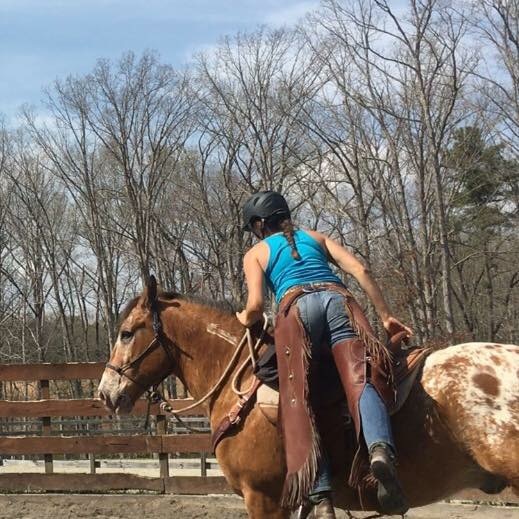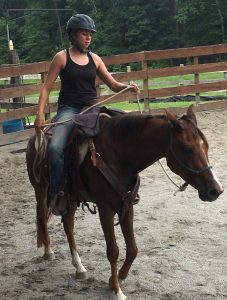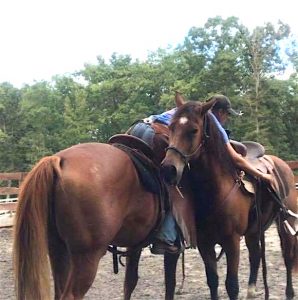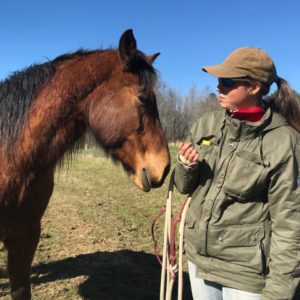 Editor’s Note: Amy Skinner is a regular guest columnist and has been a horse gal since age six. She will present with fellow trainer and rider, Katrin Silva, at the Best Horse Practices Summit.
Editor’s Note: Amy Skinner is a regular guest columnist and has been a horse gal since age six. She will present with fellow trainer and rider, Katrin Silva, at the Best Horse Practices Summit.
Skinner rides and teaches dressage and Western. Skinner has studied at the Royal Andalusian School of Equestrian Art in Spain, with Buck Brannaman, Leslie Desmond, Brent Graef, and many others. Visit Amy’s website here.
Skinner writes:
The scenario is one I’m extremely familiar with: A client calls and asks me to start a horse. They say they can only afford 30 days, and when I make no promises about a 30-day gentling, they go somewhere where they get more “bang for their buck.”
Then the horse goes to a trainer who will do this in 30 days. The client is amazed with how fast the progress is. The trainer is riding their horse through water, moving cows, standing on their back, cracking a bull whip, etc., etc.
Soon horse goes home, and the client discovers it can’t be caught or ridden without problems.
 This is when I get the call: “Will you come fix my horse?”
This is when I get the call: “Will you come fix my horse?”
Often in a 30-day start, the horse is rushed and appears to make significant progress but doesn’t gain true confidence. They don’t have enough time to soak and absorb the information. They don’t have enough time to build real experience that will translate helpfully to their owner.
It’s like the horse had finished a quick kindergarten course, and now has to go home to hold down a job. It’s the difference between studying for the multi-choice test versus studying to understand a concept. Return this horse to a non-professional and the horse is totally lost, like a student with no multi-choice options.
It takes significantly longer to restore confidence and and teach over poor information than it does to build confidence in the first place.
 Aside from the mental harm and subsequent repair, consider the math: Say thirty days of training costs $1000. Often I spend three to six months rehabilitating a damaged horse. That’s $3000-$6000, often more than what a client may have paid for the animal. That does not include the cost of any veterinary work or body work needed from any physical damage incurred through this rushed training process.
Aside from the mental harm and subsequent repair, consider the math: Say thirty days of training costs $1000. Often I spend three to six months rehabilitating a damaged horse. That’s $3000-$6000, often more than what a client may have paid for the animal. That does not include the cost of any veterinary work or body work needed from any physical damage incurred through this rushed training process.
I work holistically, assessing the horse mentally and physically, since tightness and pain contribute to behavioral problems.
Once hearing this news, many owners feel dismayed. They now have a horse they can’t handle or ride,and can’t afford the fix. This is the reason I own four “Lost Cause” horses. Their former owners didn’t know where else to turn for their horses, so I took them on. It isn’t easy to find a home for horses like these, as not everyone has the time, skill, or financial freedom to spend on horses who need this much help.
Imagine you can’t find a home for such a horse. Your options are now feeding and caring for an unrideable horse or euthanasia. In the end, either your pocket book or the horse suffers.

Amy Skinner
So how can you avoid this?
- Firstly, it’s important to take realistic stock of your abilities and financial situation. If you only ride on weekends, is it fair to own a young horse? It may have done well for the trainer because it was being ridden consistently, and not well for you because you aren’t able to.
- Are you a confident and knowledgeable rider? There is no shame in riding a “been there, done that” horse. Look logically and honestly at the challenges and demands of having a young or nervous horse.
- If you are able or determined to have this relationship work, find a trainer who can honestly assess your ability and the horse’s needs. Don’t believe any time guarantees, as a horse does not work on a person’s schedule. Cramming important concepts into this short time can be detrimental to the horse.
- Find someone willing to work with you and your horse. Take lessons, come and watch, and when the horse goes home, keep up consistently, and follow through with a good instructor.
The choice is up to you. Time is money, as humans say. The horses say its the foundation of good experiences and challenges that matter, no matter the time.
So very true. I bought a 30 day wonder horse and then had to start at the start with her. It took a long time to get her trust & I did put her with a good professional for many months as well as riding my horse under the professional’s supervision for many months. The horse & I continue to be a work in progress but she has taught me so very much.
Very few have the skills and abilities to get a solid and effective start done in 30 days. Even fewer have the desire to invest in their young or troubled horses beyond the 30 days. This is a good truth telling article and definitely applies to most. Good facts and advice. Thanks. K
What a concept!! I’ve been shopping for s trainer to help me with a foundation on 3 traumatized mustangs and actually ran into one with a 90 ride minimum at 900 for 30 rides. I find all this change of thinking interesting
Hi my horse is a 10year old warm blood. Very calm & gentle. I have never ridden her yet as I need to know she is safe perhaps a refresher with ground work I thought may be a start. I’m not young but wise enough to just be safe. I would like to trail ride& be able to ride around the property each morning. She is not troubled in anyway.
I live in Elland & hardly leave the property.
Kind Regards Josie
I have a 6 year old guilting scared of everything and people all but me they think he needs to be desensitized hard to find someone that can do that in my area I dont need him broke I can ride him
Very very good thoughts! When I was breaking colts (30 years ago) I always required at least 5 lessons with me. You can accomplish an amazing amount in 30 days (out of 40 horses only one colt was not WTC leg aids and going on trails nicely at the end of 30, that horse was eventually euthanized (he was the bi-product of breeding a crazy mare to “calm her down” and you guessed it, they got a crazy x2. Anyway, I love the wisdom in being included in the training process, do surprise visits. And run from the trainer who isn’t open to this! Happy horsing!!
I have a two-year-old Arab that I got when he was about a year old from the Sale bar. My? Husband and I separated and I? Am 56. Years old and I don’t know that I have the ineff experience in training to train him? What should I do? I know I can’t leave him a very much longer without being trained or he will not be ritable.